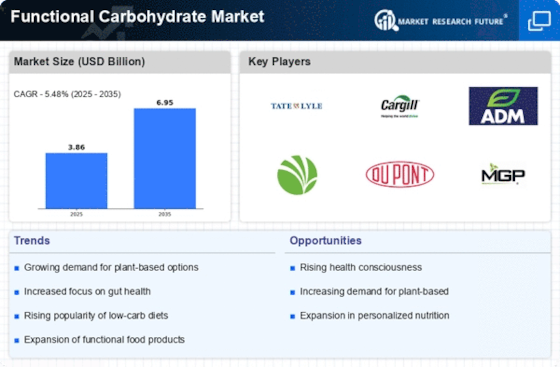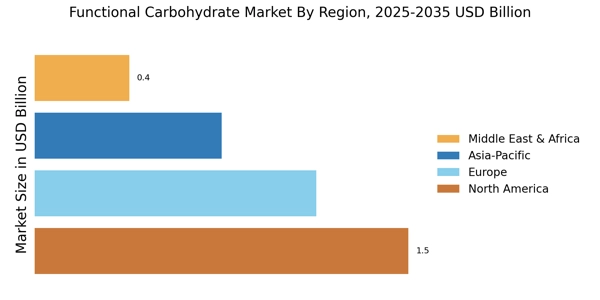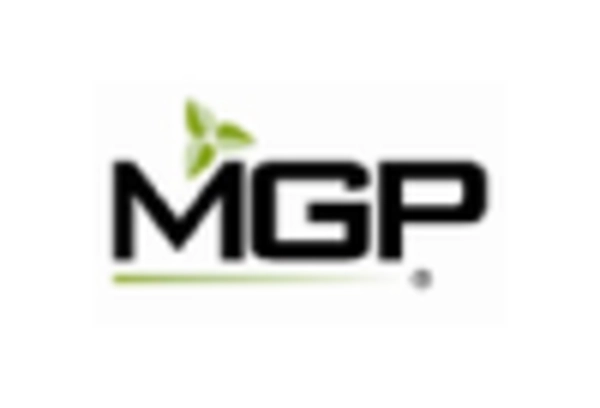Increasing Health Consciousness
The rising awareness of health and wellness among consumers appears to be a primary driver for the Functional Carbohydrate Market. As individuals become more informed about the benefits of dietary choices, there is a noticeable shift towards products that offer functional benefits. This trend is reflected in the growing demand for low-glycemic index carbohydrates, which are perceived to support weight management and metabolic health. Market data indicates that the functional carbohydrate segment is projected to grow at a compound annual growth rate of approximately 6% over the next five years, driven by this health-conscious consumer base. The Functional Carbohydrate Market is thus witnessing an influx of products that cater to these preferences, including those enriched with fibers and resistant starches.
Emerging Markets and Consumer Trends
Emerging markets are presenting new opportunities for the Functional Carbohydrate Market. As disposable incomes rise and urbanization increases, consumers in these regions are becoming more inclined to invest in health-oriented products. This shift is accompanied by a growing interest in functional foods that offer health benefits beyond basic nutrition. Market forecasts suggest that the demand for functional carbohydrates in these regions could increase by 5% annually, driven by changing dietary patterns and lifestyle choices. The Functional Carbohydrate Market is thus likely to see a diversification of product offerings aimed at meeting the unique preferences of consumers in emerging markets.
Growth of the Sports Nutrition Sector
The expansion of the sports nutrition sector is a notable driver for the Functional Carbohydrate Market. Athletes and fitness enthusiasts are increasingly recognizing the importance of carbohydrates in fueling performance and recovery. This has led to a surge in demand for functional carbohydrates that provide sustained energy release and support muscle recovery. Market Research Future indicates that the sports nutrition segment is projected to grow by approximately 7% over the next few years, with functional carbohydrates playing a crucial role in product formulations. The Functional Carbohydrate Market is thus positioned to benefit from this trend, as brands develop specialized products tailored to the needs of active consumers.
Rising Demand for Clean Label Products
The clean label movement is reshaping consumer expectations and driving the Functional Carbohydrate Market. Consumers are increasingly seeking transparency in food labeling, favoring products that contain natural ingredients without artificial additives. This trend has prompted manufacturers to reformulate their products, incorporating functional carbohydrates derived from whole food sources. Market data indicates that the clean label segment is expected to witness a growth rate of around 8% annually, as consumers prioritize health and sustainability. The Functional Carbohydrate Market is thus adapting to these demands by offering products that not only meet clean label criteria but also provide functional benefits, such as improved digestion and enhanced energy.
Technological Advancements in Food Processing
Technological innovations in food processing are significantly influencing the Functional Carbohydrate Market. Advances in extraction and formulation techniques have enabled manufacturers to create more effective and appealing functional carbohydrate products. For instance, the development of enzymatic processes allows for the enhancement of carbohydrate functionality, improving their health benefits and sensory attributes. This has led to a broader range of applications in various food products, from snacks to beverages. Market analysis suggests that the integration of these technologies could lead to a 10% increase in product offerings within the next few years, thereby expanding the Functional Carbohydrate Market. As companies invest in research and development, the potential for novel functional carbohydrates continues to grow.

















